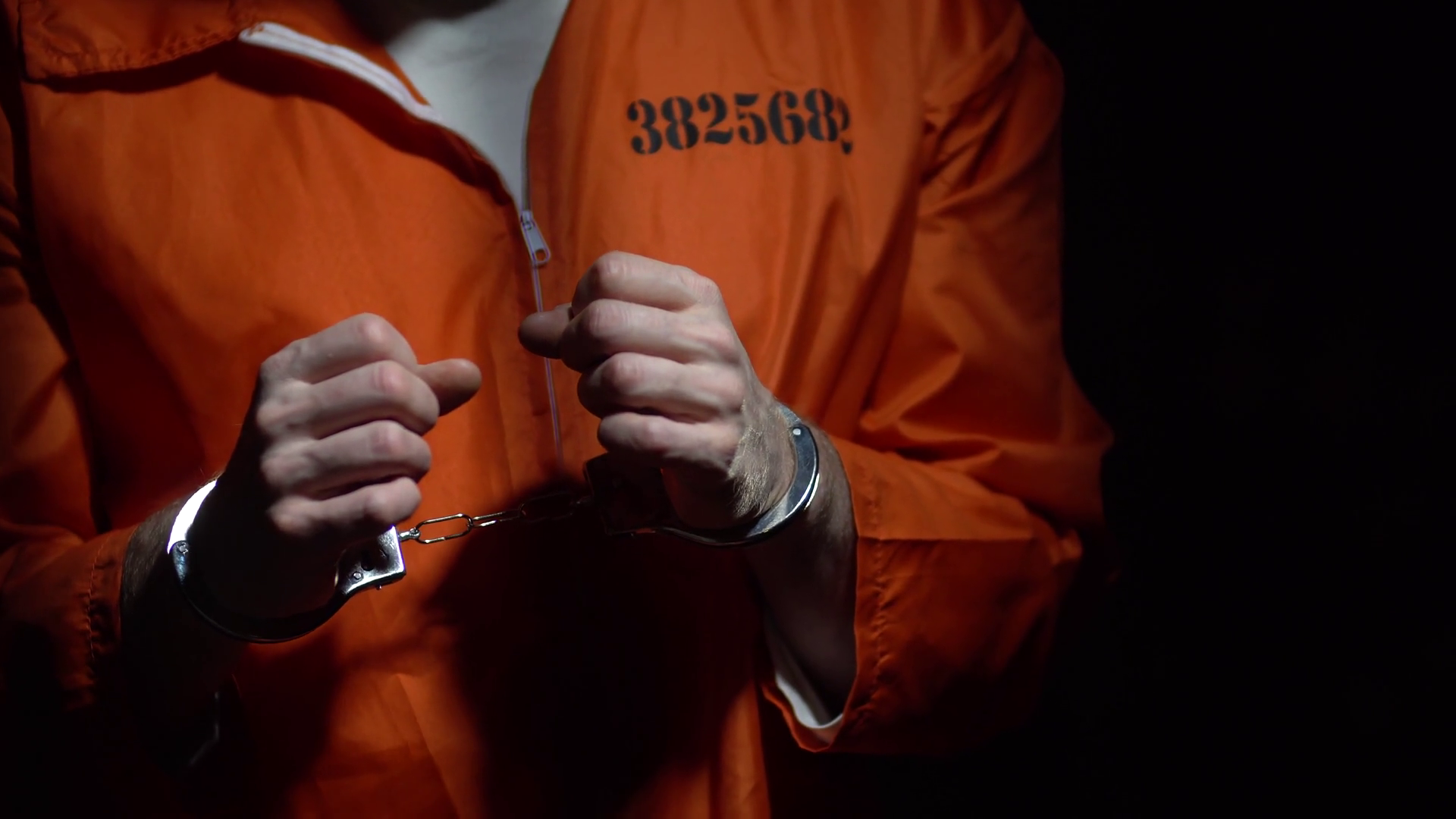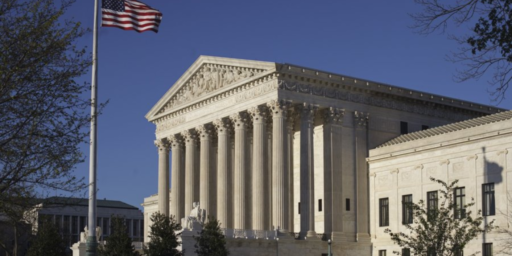Senate Overwhelmingly Passes Criminal Justice Reform
The Senate overwhelmingly passed major reforms in Federal sentencing and related laws. As the name of the bill implies, it's a first step, but a good first step.

Late yesterday in a rare sign of bipartisan cooperation, the Senate passed a broad-ranging criminal justice reform bill that is long overdue:
The Senate on Tuesday overwhelmingly passed a sweeping overhaul of the criminal justice system, after a remarkable political shift from Republicans who voted in large numbers to save money by reducing prison sentences, handing a rare bipartisan victory to President Trump.
The First Step Act passed on a vote of 87 to 12, with dozens of Republicans, including longtime holdout Majority Leader Mitch McConnell (R-Ky.), joining all 49 members of the Democratic caucus to approve legislation that even some GOP supporters fear could leave them vulnerable to charges of being soft on crime.
Senate Judiciary Committee Chairman Sen. Charles E. Grassley (R-Iowa) tried to allay those concerns shortly before the final vote, stressing that Trump “wants to be tough on crime, but fair on crime” — and had told him personally that he had his “pen ready to sign this bill.”
And minutes after the vote, Trump tweeted his congratulations to the Senate, stressing that his “job is to fight for ALL citizens, even those who have made mistakes.”
“This will keep our communities safer, and provide hope and a second chance, to those who earn it,” he wrote on Twitter. “In addition to everything else, billions of dollars will be saved. I look forward to signing this into law!”
The product of years of negotiations, the legislation represents a major pivot for the GOP, which decades ago embraced a law-and-order rallying cry and war on drugs campaign as crucial to winning votes. But as crime rates have dropped and states have pursued cost-effective ways to cut the prison population, Congress has favored changes to the system, with GOP lawmakers arguing for rehabilitating some offenders rather than longtime incarceration.
The bill would revise several sentencing laws, such as reducing the “three strikes” penalty for drug felonies from life behind bars to 25 years and retroactively limiting the disparity in sentencing guidelines between crack and powder cocaine offenses. The latter would affect about 2,000 current federal inmates.
It also overhauls the federal prison system to help inmates earn reduced sentences and lower recidivism rates. A different version passed the House this year, so the House would have to pass the latest draft before it can be sent to Trump for his signature. The House is expected to endorse that bill when it comes up for a likely vote later this week, and House Speaker Paul D. Ryan (R-Wis.) has expressed support for the legislation.
The bill, which does not cover state jails and prisons, would through reductions in sentencing do the equivalent of shaving a collective 53,000 years off the sentences of federal inmates over the next 10 years, according to the Congressional Budget Office — though some advocacy groups dispute this figure. There were about 181,000 federal inmates as of Dec. 13, according to the Bureau of Prisons.
The bill received a major boost last month when Trump endorsed it as “reasonable sentencing reforms while keeping dangerous and violent criminals off our streets.” His thinking was heavily influenced by his son-in-law and White House adviser Jared Kushner, who has long advocated sentencing restructuring and marshaled endorsements of the bill from a diverse coalition including law enforcement, and the American Civil Liberties Union.
(…)
Before the final vote, the bill’s supporters fended off several amendments considered “legislative poison pills” that they said were designed to kill the bipartisan compromise that was been carefully negotiated among Democratic and GOP lawmakers, as well as the Trump administration.
Those included a measure from Sens. Tom Cotton (R-Ark.) and John Neely Kennedy (R-La.) that would have barred people convicted of various offenses, including certain sex crimes, from being able to qualify for reduced sentences. The legislation has a number of exclusions, but Cotton and Kennedy wanted to add more crimes to the list, such as coercing a minor for sexual activity.
Lawmakers unanimously voted to include in the package a proposal from Sens. Ted Cruz (R-Tex.) and James Lankford (R-Okla.) to exclude more categories of crimes from being eligible for sentencing reductions, and ensure the freedom and involvement of faith-based groups in elements of prison overhaul.
CBS News reporter Nancy Cordes had a brief review of what’s in the bill this morning:
A package of wide-ranging criminal justice reforms is one step closer to becoming law. After years of negotiations, the Senate approved the First Step Act, 87 to 12. The House is expected to pass it later this week and send it to the president. @NancyCordes reports: pic.twitter.com/qPI6IhfrqI
— CBS This Morning (@CBSThisMorning) December 19, 2018
One of the more interesting things about this bill, of course, is that it is the end result of what has been a bipartisan effort that has brought in legislators and advocacy groups from both sides of the political aisle. Two of the most prominent voices in the Senate supporting measures such as this, foe example, have been Kentucky Senator Rand Paul and New Jersey Senator Cory Booker, who are about as far apart ideologically as you can get in the Senate. Additionally, the bill was supported by groups generally believed to be on the political left such as the American Civil Liberties Union and groups on the right such as FreedomWorks, where Vice President of Legislative Affairs Jason Pye released this statement after the Senate passed the bill last night:
“This was a historic night in the Senate. The First Step Act is a product of several years of bipartisan negotiations based on the successful reforms in red states like Georgia, Mississippi, South Carolina, and Texas. The efforts of our champions — Sens. Chuck Grassley, Mike Lee, and Rand Paul — were apparent in the votes this evening. The Senate has done its job. We urge the House to pass the First Step Act and send it to President Trump’s desk to be signed into law.”
This kind of bipartisanship is, sadly, all too rare in Washington today, so it was heartening to see it play out here in a policy area that has been neglected for far too long.
The bill isn’t perfect, of course. Several of the Amendments that did pass seem to unfairly deny people convicted of some non-violent crimes of eligibility for sentencing reduction or other benefits under the law, for example. Additionally, while the law will go a long way toward alleviating the problems of people caught up in the Federal criminal justice system it does not apply to the states, where the vast majority of non-violent felons are held and in which things such as mandatory minimum sentences, three-strikes laws, and difficulties in being accepted for parole or probation remain serious problems. Addressing those problems would require similar legislation at the state level, which one hopes will follow on the momentum that should be created by the passage of this bill. On top of all this, there are still several issues regarding Federal sentencing, the conditions in Federal prisons, and the manner in which those convicted of crimes are treated after they have finished serving their sentence. However, as the name of this bill — the First Step Act — implies, this is a good first step down a road that has been ignored for too long.
In any case, now that the bill has passed the Senate it heads to the House of Representatives where it is expected to pass with bipartisan support. That last part is perhaps the most important part of what happened yesterday. The final vote on the bill in the Senate was 87-12, and the bill was supported by every Senate Democrat and 38 of the 51 members of the Senate Republican Caucus. It is expected that the vote in the House will be similarly bipartisan. Additionally, the bill has received the endorsement of President Trump thanks largely to lobbying by his son-in-law, Jared Kushner, for whom criminal justice reform became something of a personal issue given what happened to his father. That’s rare enough in today’s day and age to be notable. In any case, this is one of those rare things you see from Congress these days, a solid win on an important issue. Hopefully, it will truly be just the first step in reforming a criminal justice badly in need of reform.




![McConnell, Other Republicans, Blocking Criminal Justice Reform [Updated: Vote To Go Forward]](https://otb.cachefly.net/wp-content/uploads/2018/12/Handcuffs-Jail-512x256.png)

Woah…people have been talking about that for 20 years.
More.
It has been a long journey to get this bill to fruition, and it’s just the start of what will be a decades long process to reform our justice system. A process that will play out in town councils, state houses, and Congress.
While it may seem surprising at first that this bill had the backing of both the ACLU and Freedomworks, Booker and Paul, behind the scenes these players have been working together for years. The two biggest donors to the ACLU’s Indigenous Defense Fund have been George Soros and the Koch Brothers. How’s that for getting all of politics’ boogeymen in one room?
Oklahoma and Mississippi started the ball rolling, when those states passed bipartisan (albeit limited) reforms. Behind the scenes, similar work is being done in statehouse in Indiana, Ohio, Idaho, Hawaii, Washington–the list goes on.
This bill is far from perfect, but it’s an incredibly exciting first step. And, unlike many other political movements, there’s no reason to believe this is a final step.
@James Pearce:
Out of curiosity, what state do you live in? Colorado? I might be able to get you some insider info on whether or not “more” is developing in your state.
This is truly good news, both for the sake of the bill itself, but also for the fact that they worked across the aisle.
While it’s a good step, consider it’s been years in the making. While some states might follow suit now, I wouldn’t expect further action in reform for a while. Some could be easily accomplished through policy, such as removing marijuana from the schedule it’s in, and not persecuting in Federal court marijuana offenses at all, or at least in states where it’s legal. Oh, and not to mention not treating asylum seekers as criminals.
First, while it’s ultimately a small first step, this act is still a win for many people within Federal Prisons (not to mention the advocates who tirelessly worked on getting this to the finish line… we’re still not over it yet).
To that point:
@Neil J Hudelson:
Just wanted to second what Neil is saying. CJ Reform, as I’ve come to appreciate, is an area where there are lots of strange bedfellows (at least by conventional political wisdom).
Yes. Sadly it took budget crisis created from mass incarceration to lead to this. But the reality is that’s where we are and this is an opportunity for us to change things.
Further, its worth noting that in many cases Red States are currently leading the charge on a number of these issues (at least in the space that I’m the most familiar with, data transparency).
That’s our hope too. Though the reality is that much of that is still going to have to happen at the State level. It’s telling that Tim Scott was not able to get any momentum on his data transparency amendment. Right now the current powers that be are just not interested in any state-level reporting requirements that have any teeth.
BTW, the greater success here was that the Cotton and Kennedy amendments were also roundly defeated.* They were particular malicious and were essentially designed to scuttle the legislation.
* – It’s unfortunate that Cruz was able to increase the categories of time-credit exclusions… sadly we’re not going to be able to really reduce our prison population if we keep punting when it comes to violent crimes.
@Neil Hudelson: Yep, Colorado. I’d be curious to see what you’ve got.
(Cory Gardner almost legalized marijuana at the federal level -at least for legal-weed states.)
@Neil J Hudelson:
Ugh. Make that indigent defense fund.
Idiot.
I will believe we really are on the rod to CJR when private prisons are a thing of the past.
@Neil Hudelson:
I had guessed that but didn’t want to mention it. FWIW, I make that mistake too. I’ve also learned that I have a mental block on spelling “practitioner” (which is a term used a lot in the biz).
@OzarkHillbilly:
On the one hand, I completely agree. On the other hand, I think it’s really important for progressives to understand that people in Private Prisons make up only 8.5% of the entire US prison population. Granted, it’s still egregious, but it’s important to note that we could fully eliminate private prisons tomorrow and it would put only a (very) small dent in our mass-incarceration problem. They are a symptom of the issues with our system, but that’s it.
Unfortunately, a lot of people (I’m not saying you) have come to believe that eliminating private prisons will take care of mass incarceration. That’s just not born out by the data.
BTW, I used to be part of that group. Living with CJ data has forced me to reexamine my views — or really look beyond the easy/feel-good issues.
@James Pearce:
Oh, if only that was the case. Corey floated an amendment that would (sadly) never pass… not unlike Tim Scott trying to push for data transparency on police shootings.
Unfortunately, neither had/have enough support to make it to the floor. While I support both measures, both actions were largely publicity stunts to play to local audiences*. Which is an unfortunate reminder about how conservative our approach to criminal justice is.
* – Two points:
(1) The fact that (my understanding is) in both cases they needed unanimous approval of the Senate to be added to the bill serves as an example of the fact that both were proposed at largely symbolic legislation.
(2) I also believe that while these are symbolic actions, both Gardner and Scott actually believe in what they are trying to advance.
@mattbernius: This is a good thing overall if certain precautions and procedures are followed. Under no circumstances should violent criminals be released: gang members, dope pushers, serial killers, bank robbers, terrorists. The local police should be kept informed of who is being released.
Certainly non-violent people should be on a quick path to release, provided they have behaved.
The bill seems to have a motley crew of supporters and should be a good thing.
@Tyrell:
Thank you for the stark reminder of how we became the most over-incarcerated country in the so-called “modern world.” And continue that trend despite crime — violent and otherwise — being at historical lows.
@mattbernius:
It’ll never pass if no one attempts to get it passed, and to be honest, I’d prefer full legalization as the ultimate solution anyway, but in the meantime I’ll commend Gardner’s efforts on the matter. It’s not something he really wants to do, but he’s working on it anyway because Colorado voters want him to.
@Tyrell: Gang members, dope pushers, serial killers, etc. are not involved in the legal marijuana business.